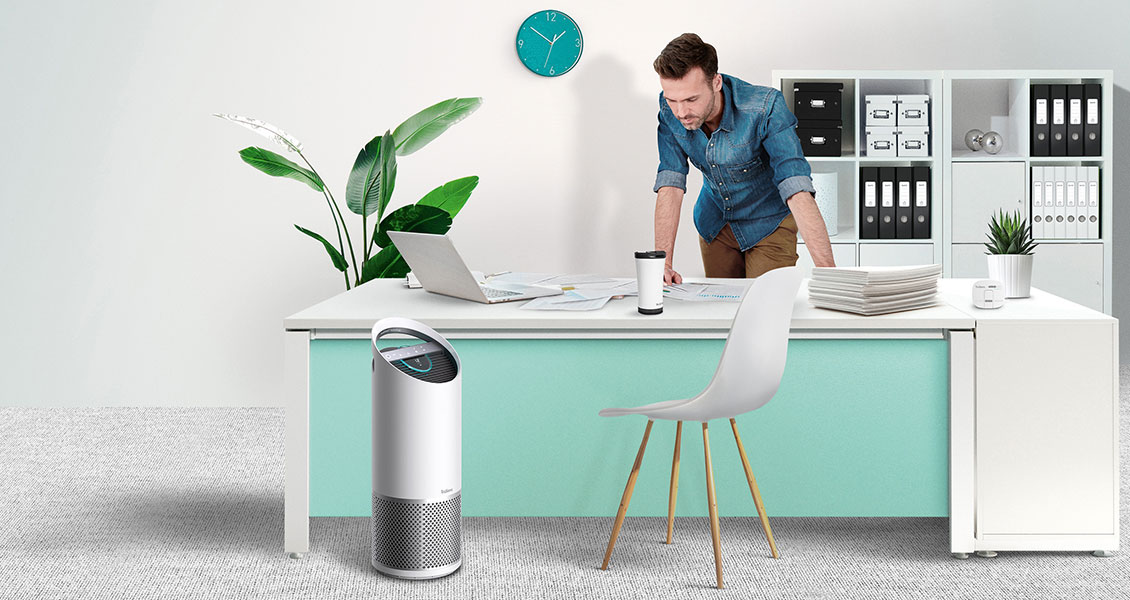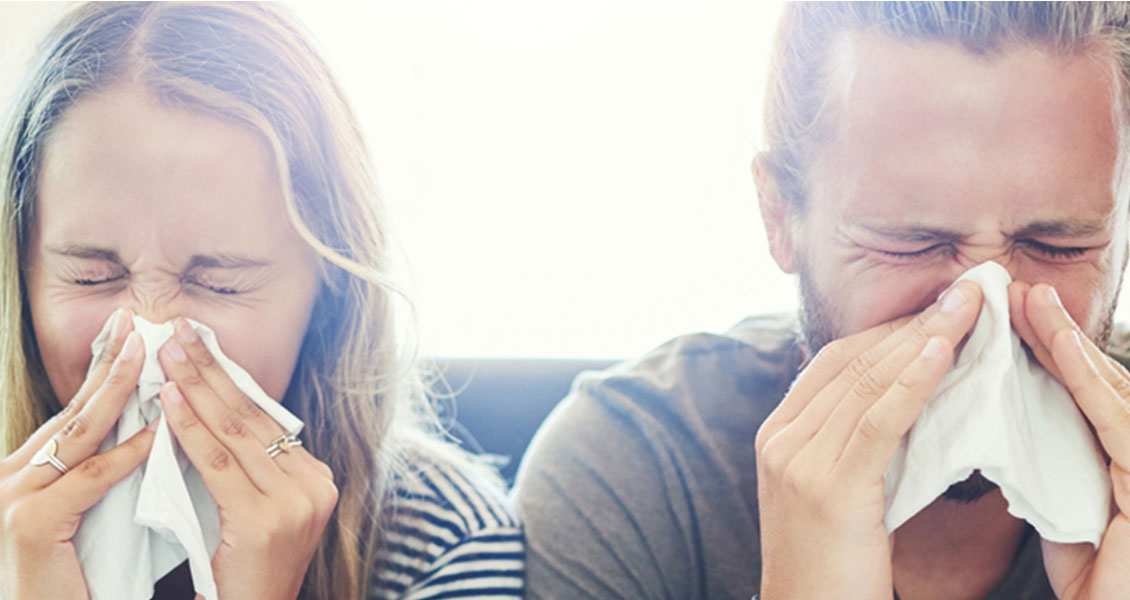How to Prevent Cold and Flu and Relieve Symptoms
15.12.2022

With the colder months comes a higher risk of catching a cold and flu. Whilst these are different viruses, they’re transmitted in similar ways and can have similar symptoms. There is, unfortunately, no cure for cold and flu. However, there are some steps we can take to reduce the risk of catching these viruses, and also help relieve symptoms if we do get ill.
How to prevent cold and flu
Air purifier
One of the best cold and flu prevention techniques is to improve indoor air quality by using an air purifier. Many illnesses, including colds, flu, and COVID-19 can be spread through the air. Small droplets are expelled when an ill person sneezes, coughs or breathes. These droplets then travel through the air where they can be inhaled by another person, or they end up on surfaces where they can be picked up by someone.
Airborne virus transmission can occur over a long period of time, with droplets staying in the air for extended periods. This means that even if an ill person has left the room, there is still a danger of catching the illness.
An air purifier can help to make the air in a room cleaner and fresher. Our Leitz TruSens Air Purifiers deliver cleaner air efficiently throughout the room. They use a bi-directional airflow that has been proven to be up to 24% more effective than purifiers that only have one direction of airflow.
Our air purifiers also have an indoor air quality monitor, the SensorPod, which checks the air quality in the room and feeds the information back to the purifier. The air purifier can then adjust its output as necessary.

Our air purifiers can be equipped with a HEPA Filter Drum specifically designed to combat flu and viruses, as well as allergies. It captures 99.97% of airborne viruses and allergens, including COVID-19. UV-C light kills germs and bacteria that are trapped in the filter, to prevent any retransmission.
Our Leitz TruSens Z-3500H comes with a smartphone app so you can stay connected at all times, monitoring the indoor air quality and adjusting your air purifier as needed. It even works with your Alexa voice AI, so you can control your air purifier through your Alexa smart speaker.
Find out more about which air purifier is right for you in our air purifier buying guide.
Clean surfaces
Another way to help prevent cold and flu is to regularly clean surfaces that are frequently touched. Germs can live on surfaces for up to 24 hours, so cleaning them with an anti-viral wipe or spray can help to kill these germs and prevent the transmission of illness.
You should routinely clean your mobile phone as well as places around your home or workplace that are touched a lot. A clean desk and workstation can be a huge benefit in reducing the risk of illness. Make sure to clean your keyboard, mouse, and phone regularly, as well as any shared equipment such as staplers or hole punches.
If someone is ill at home, you should try to regularly clean doorknobs and taps. You should avoid sharing items like towels or utensils with anyone who is sick.
Hand hygiene
Washing your hands regularly can help to prevent cold and flu transmission. Ideally, you should be washing your hands thoroughly with soap and warm water, as this is the best way to eliminate germs. If soap and water aren’t available, an alcohol rub can suffice.
You should try to avoid touching your face, especially your eyes, nose or mouth when you’re out and about. This can pass germs from your hands to your respiratory system, which is what can make you ill.

Vitamins
Your body needs the right vitamins to be able to fight off illnesses. Eating a balanced diet with plenty of fruit and vegetables can help your body to get the right nutrients.
You can help to boost your vitamin intake with supplements. While taking vitamin C when you’re already ill might not get rid of the illness, regularly taking vitamin C can help to reduce the duration of your cold and flu symptoms.
Protect others
You can help to reduce the spread of cold and flu by protecting others if and when you become ill. If you feel unwell, you should stay at home and not go to work.
To help stop the spread, you should try to cough and sneeze into a tissue, away from anyone else, and dispose of the tissue as soon as possible. You should avoid close contact with anyone whilst you’re ill. You’ll be infectious until all your symptoms have gone, which can take one to two weeks.
Flu vaccine
The flu vaccine will help you to avoid getting ill with the flu, although it will not protect you against cold. Some people, such as those who are deemed high-risk, may be able to get the flu vaccine for free, while others will be able to pay for it.
Getting the flu vaccine is an effective way to protect yourself against becoming ill from the flu virus. While there is still a chance you can get the flu, any symptoms you experience will likely be much milder and last for a shorter period. It can also help you to stop spreading illness to other people.
How to relieve cold and flu symptoms
Rest
An effective cold and flu treatment is to rest and sleep. Your body will expend a lot of energy in fighting off the virus. Conserving energy by resting gives your body a better chance to heal and beat the virus.
Hydration
Another important cold and flu treatment is to stay hydrated by drinking plenty of water, or you can also drink fruit juice or squash. Your body might get dehydrated when you have a cold or flu, so drinking plenty of liquid can help prevent this. You should avoid caffeinated or alcoholic drinks, as these can make you more dehydrated.
Warm liquids
One of the best cold and flu remedies is to consume warm liquids. The warmth can help to clear congestion while soothing you. Soup is a great way to consume warm liquids and can also help to give your body the vitamins and nutrients it needs to fight off the virus.
You can also drink warm tea, such as lemon and ginger with honey. Lemon is rich in vitamin C, which is needed for a healthy immune system and ginger can help relieve any nausea you might be feeling. Honey can be effective in soothing a sore throat and relieving coughs.
Over-the-counter medication
Ibuprofen or paracetamol can help to relieve aches and pains and lower a temperature that you might get from cold and flu. You can also get medication specifically for colds and flu, which will help to relieve pain, blocked noses, and sore throats. They will also sometimes contain caffeine, which can help if you are feeling fatigued.
You can also buy decongestant nasal sprays or drops to help relieve a blocked nose. You should always check the label for any medication you take and be wary if you’re taking multiple types, to ensure you’re not taking too much.
Gargle salt water
Gargling salt water can help to relieve a sore throat. You’ll need around half a teaspoon of salt dissolved in a glass of warm water to gargle and then spit out. You can repeat this as often as you like.
Gargling with salt water draws liquids to the surface in your mouth and throat, which also brings the virus or bacteria that are present. When you spit the water out, you’re also helping to get rid of some of the germs. This can help to relieve pain and inflammation.
Steam inhalation
Adding moisture into the air can help to loosen congestion. You can use a humidifier for the room or put hot water into a bowl and place a towel over your head so you can breathe in the steam.
A steamy shower and a hot bath can also help to ease congestion, as well as relieve aches and pains.
Discover our range of air purifiers to improve your indoor air quality and reduce the risk of illness.
Read more about how to combat indoor air pollution and how to prevent cold and flu:
Cold and Flu Prevention Tips for the Workplace